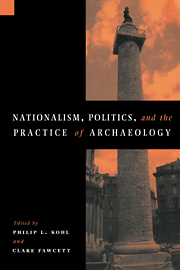Book contents
- Frontmatter
- Contents
- List of maps
- List of contributors
- Acknowledgments
- Part I Introduction
- Part II Western Europe
- Part III Eastern Europe and Eurasia
- Part IV East Asia
- 11 Thirty years of Chinese archaeology (1949–1979)
- 12 The regionalist paradigm in Chinese archaeology
- 13 The politics of ethnicity in prehistoric Korea
- 14 Nationalism and postwar Japanese archaeology
- Part V Commentary
- Bibliography
- Index
12 - The regionalist paradigm in Chinese archaeology
Published online by Cambridge University Press: 06 October 2009
- Frontmatter
- Contents
- List of maps
- List of contributors
- Acknowledgments
- Part I Introduction
- Part II Western Europe
- Part III Eastern Europe and Eurasia
- Part IV East Asia
- 11 Thirty years of Chinese archaeology (1949–1979)
- 12 The regionalist paradigm in Chinese archaeology
- 13 The politics of ethnicity in prehistoric Korea
- 14 Nationalism and postwar Japanese archaeology
- Part V Commentary
- Bibliography
- Index
Summary
A nationalist interpretive framework, emphasizing the antiquity, uniqueness, purity, and importance of Chinese civilization, is so basic to the pursuit of history and archaeology in China that it would seem a moot exercise to expound on it. If our objective is to lie in sounding out the intellectual atmosphere of present-day Chinese archaeological practice, it may be more relevant, as well as more interesting, to explore how subtle inter-regional tensions within the country have lately been symbolically played out through the public presentation of archaeological data. This is the main task of this chapter. We shall, however, never veer far from the topic of nationalism in archaeology; understanding the new regionalist paradigm in Chinese archaeology may indeed help us to perceive in more general terms how nationalism has come to be culturally reconfigured in China during the eighties and early nineties.
New frameworks of interpretation
During the last decade, the study of prehistoric and early historical archaeology in China has undergone a change of paradigm. Until the late seventies, all of Chinese civilization had been perceived as originating from a narrowly circumscribed area along the middle reaches of the Yellow River, from where it gradually spread outward.
- Type
- Chapter
- Information
- Nationalism, Politics and the Practice of Archaeology , pp. 198 - 217Publisher: Cambridge University PressPrint publication year: 1996
- 10
- Cited by

